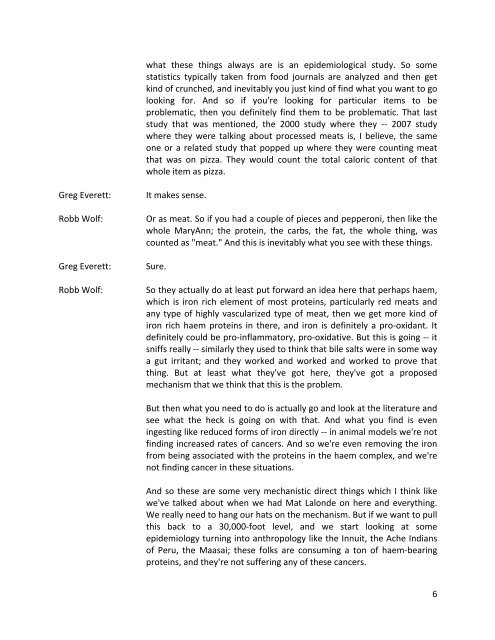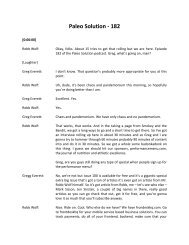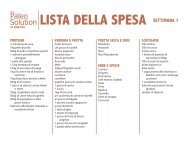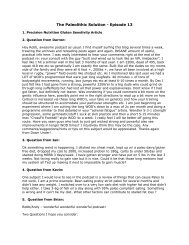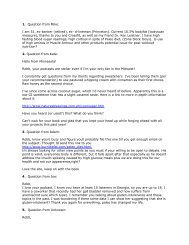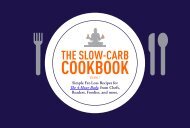Download a transcript of Episode 70 - Robb Wolf
Download a transcript of Episode 70 - Robb Wolf
Download a transcript of Episode 70 - Robb Wolf
You also want an ePaper? Increase the reach of your titles
YUMPU automatically turns print PDFs into web optimized ePapers that Google loves.
Greg Everett: It makes sense.<br />
what these things always are is an epidemiological study. So some<br />
statistics typically taken from food journals are analyzed and then get<br />
kind <strong>of</strong> crunched, and inevitably you just kind <strong>of</strong> find what you want to go<br />
looking for. And so if you're looking for particular items to be<br />
problematic, then you definitely find them to be problematic. That last<br />
study that was mentioned, the 2000 study where they -‐-‐ 2007 study<br />
where they were talking about processed meats is, I believe, the same<br />
one or a related study that popped up where they were counting meat<br />
that was on pizza. They would count the total caloric content <strong>of</strong> that<br />
whole item as pizza.<br />
<strong>Robb</strong> <strong>Wolf</strong>: Or as meat. So if you had a couple <strong>of</strong> pieces and pepperoni, then like the<br />
whole MaryAnn; the protein, the carbs, the fat, the whole thing, was<br />
counted as "meat." And this is inevitably what you see with these things.<br />
Greg Everett: Sure.<br />
<strong>Robb</strong> <strong>Wolf</strong>: So they actually do at least put forward an idea here that perhaps haem,<br />
which is iron rich element <strong>of</strong> most proteins, particularly red meats and<br />
any type <strong>of</strong> highly vascularized type <strong>of</strong> meat, then we get more kind <strong>of</strong><br />
iron rich haem proteins in there, and iron is definitely a pro-‐oxidant. It<br />
definitely could be pro-‐inflammatory, pro-‐oxidative. But this is going -‐-‐ it<br />
sniffs really -‐-‐ similarly they used to think that bile salts were in some way<br />
a gut irritant; and they worked and worked and worked to prove that<br />
thing. But at least what they've got here, they've got a proposed<br />
mechanism that we think that this is the problem.<br />
But then what you need to do is actually go and look at the literature and<br />
see what the heck is going on with that. And what you find is even<br />
ingesting like reduced forms <strong>of</strong> iron directly -‐-‐ in animal models we're not<br />
finding increased rates <strong>of</strong> cancers. And so we're even removing the iron<br />
from being associated with the proteins in the haem complex, and we're<br />
not finding cancer in these situations.<br />
And so these are some very mechanistic direct things which I think like<br />
we've talked about when we had Mat Lalonde on here and everything.<br />
We really need to hang our hats on the mechanism. But if we want to pull<br />
this back to a 30,000-‐foot level, and we start looking at some<br />
epidemiology turning into anthropology like the Innuit, the Ache Indians<br />
<strong>of</strong> Peru, the Maasai; these folks are consuming a ton <strong>of</strong> haem-‐bearing<br />
proteins, and they're not suffering any <strong>of</strong> these cancers.<br />
6


